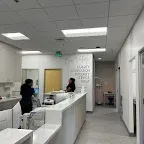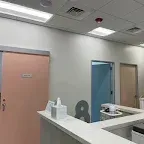
Fairway Children’s Medical Group Named Top Performing Pediatrician By L.A. Care
Discover how to become a Top Performing Pediatrician with our expert tips and strategies for success in the medical field.
Read More →Fairway Children's Medical Group in West Covina, California, led by Eva Chan, MD, FAAP, and Jackyln Chan, MD, FAAP, and the expert team, is an exceptional pediatric practice offering comprehensive, compassionate care for children of all ages — newborn to age 21.


Lukas Torio
A week ago

Dr. Jackie is amazing! She’s kind, attentive, and really takes the time to listen and explain everything in a way that’s easy to understand. I always feel comfortable and cared for during my visits. You can tell she genuinely cares about her patients and their well-being. I’m really grateful to have her as my doctor!

李ken
A month ago

It’s amazing Excellent clinic environment. My child has been having checkups here since birth, and now he’s already in middle school



Sabrina Gutierrez
A month ago

Dr. Jackyln and Eva Chan are absolutely amazing. They take their time with their patients and really explain everything so well. You can feel how much they care for their patients and families. My kids love going to them and we’re so happy we found great doctors. They go above and beyond to do what they can to really listen and help. It’s a great staff and we’re lucky to have found a great team to help care for our children.

Discover how to become a Top Performing Pediatrician with our expert tips and strategies for success in the medical field.
Read More →
Get your child’s flu shot at Diamond Bar & West Covina's Fairway Children's Medical Group. Simple, safe, and stress-free protection.
Read More →
RSV, flu, or COVID-19? Learn key differences, symptoms, and when to seek care. Book online or call today!
Read More →
Learn when symptoms like fever, fatigue, or runny nose mean it's time to keep them home.
Read More →No, we currently DO NOT take walk-ins. However, we do our very best to give same-day visits depending on the physicians schedule that day but it must be made in advanced. All visits must be scheduled IN ADVANCE!
If your child has an urgent matter that requires immediate attention, we would recommend you go to the nearest
Drop off the form to one of our staff members during normal office hours and we will have it completed it for you WITHIN 3-5 business day. Most forms will require a form fee of $35 for our administrative time. If you need it rushed, there is a rush fee of $10.
You can either pick it up in person or the completed form can be e-mailed to you.
You can schedule an appointment by
1) Requesting an appointment through your patient portal
2) Submitting a request online HERE
3) Calling our office during regular business hours
Yes, we are accepting new patients. Please complete the new patient registration form HERE and one of our staff will check insurance eligibility before contacting you back to schedule an appointment.

Office Location
2707 E Valley Blvd, Suite 215, West Covina, CA 91792
888 S Brea Canyon Rd Ste 330
Diamond Bar, CA 91789
Hours Of Operation
Monday: 9AM-1PM & 2PM-6PM (DIAMOND BAR)
Tuesday: 9AM-1PM & 2PM-6PM (DIAMOND BAR)
Wednesday: 9AM-1PM & 2PM-6PM (WEST COVINA)
Thursday: 9AM-1PM & 2PM-6PM (DIAMOND BAR)
Friday: 9AM-1PM (DIAMOND BAR)
Saturday: 9AM-1PM (DIAMOND BAR)
Sunday: CLOSED
Contact Us
909-594-3382
Fax Number: 626-667-7633
© 2025 Fairway Children's Medical Group. All rights reserved.